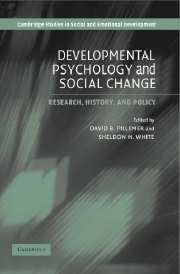Book contents
- Frontmatter
- Contents
- Preface
- List of Contributors
- Introduction: What Kind of Science Is Developmental Psychology?
- Part One The Developing Child: Global and Historical Perspectives
- 1 The Globalization of Developmental Psychology
- 2 A Socio-historical Perspective on Autobiographical Memory Development
- 3 Toward a Better Story of Psychology: Sheldon White's Contributions to the History of Psychology, A Personal Perspective
- Part Two Designing Child and Family Policies
- Part Three Designing Child Health Policies
- Part Four Designing Effective Learning Environments for Children and Adolescents
- Index
- References
3 - Toward a Better Story of Psychology: Sheldon White's Contributions to the History of Psychology, A Personal Perspective
Published online by Cambridge University Press: 03 December 2009
- Frontmatter
- Contents
- Preface
- List of Contributors
- Introduction: What Kind of Science Is Developmental Psychology?
- Part One The Developing Child: Global and Historical Perspectives
- 1 The Globalization of Developmental Psychology
- 2 A Socio-historical Perspective on Autobiographical Memory Development
- 3 Toward a Better Story of Psychology: Sheldon White's Contributions to the History of Psychology, A Personal Perspective
- Part Two Designing Child and Family Policies
- Part Three Designing Child Health Policies
- Part Four Designing Effective Learning Environments for Children and Adolescents
- Index
- References
Summary
Introduction
Entering Harvard as an undergraduate in 1946, Sheldon (Shep) White intended to study psychology. With strong prior interests in both literature and politics, scientific psychology seemed a reasonable extension of those interests, perhaps a way of being rigorously scientific about human behavior and experience. However, he was dropped into the middle of the fray of debate about what constitutes a properly scientific psychology (White, 2001).
It felt like being in a broken home, with White shuttling back and forth between two parents. On one side were the experimental psychologists in the basement of Memorial Hall, Edwin G. Boring, S. S. Stevens, and by 1948, B. F. Skinner. He took Psychology 1 with Boring, focusing on experimental studies of sensation, perception, and reaction time. “It was scientifically virtuous but dull as dishwater” (White, 2001, p. 2). On the other side was the newly formed Department of Social Relations, with personality and social psychologists, sociologists, and cultural anthropologists (Allport, Murray, Parsons, Kluckhohn), with the personality and social psychologists still located in Emerson Hall. He took Social Relations 1a with Allport, which had some colorful readings and lectures, but wondered “what did it all mean programmatically or scientifically?” (White, 2001, p. 2). Neither group seemed to have an adequate account of what it and the other group of psychologists were doing.
White attended graduate school at Iowa, a leading department of experimental psychology dominated by Hull–Spence theory. He experienced this as an improvement and had a “marvelous time” there.
- Type
- Chapter
- Information
- Developmental Psychology and Social ChangeResearch, History and Policy, pp. 59 - 80Publisher: Cambridge University PressPrint publication year: 2005
References
- 2
- Cited by



